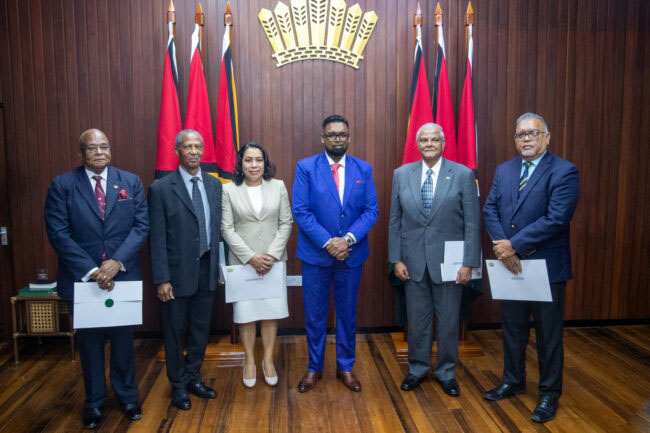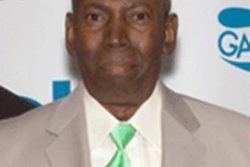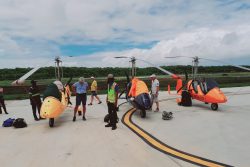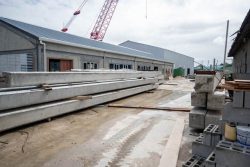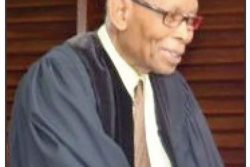More than four months after the announcement of their selection, members of the Natural Resource Fund Board were yesterday sworn in and given their instruments of appointment by President Irfaan Ali who reiterated that his government will not interfere in the Board’s work.
In addition, members of the Public Accountability and Oversight Committee and the Investment Committee were named and given their letters of appointment.
And while United Kingdom Labour Member of Parliament, David Lammy, was named with the others to the NRF Board in April, Ali yesterday announced that he had asked to be taken off the list, given his commitments in his home country. He has been replaced by former Caribbean Development Bank President, Professor Compton Bourne.
“In our initial list… you would know that we had Mr David Lammy. As we all know, the circumstances in the environment of which is he operating is changed, And due to changes in his requirements at home in the UK, he asked us not to have him play a part on this Board at this time, because it would not be keeping with what his priorities are in the UK,” the President informed during his remarks at the Office of the President.
The members of the National Resources Fund Board are: Major General (ret’d) Joseph Singh (chairman); Ambassador Carolyn Rodrigues-Birkett; Bourne; Dunstan Barrow; and Ramesh Dookhoo.
The members of the Public Accountability and Oversight Committee are: Clement Sealey (chairman), Wendell Jeffrey, Abu Zaman, Ryan Alexander, Dawn Gardener, Aslim Singh, Desmond Sears, Savitri Balbahadur, and Teni Housty.
Members of the Invest-ment Committee are: Shaleeza Shaw (chairperson), Michael Munroe, Richard Rambarran, and Loris Hukumchand.
The president noted that from the pool of appointed persons, the public can assess the choices made in the selection and be the judge.
“We promised that in administering our responsibility to this sector that we would have persons who demonstrate the capacity and capability, and more importantly the government would have an arm’s length relationship, and would have a group of people not political in nature.”
“We are very pleased today that we have been able to fulfil this responsibility and that the management of our oil and gas resources is now strengthened by these important boards and committees,” he added.
Government had in April of this year announced the names for the NRF Board with President Ali informing that his choice for Chairman was Joe Singh.
It is unclear why there was a delay of over four months in solemnizing their appointments so that work could begin.
Following the appointments yesterday, the NRF Chairman and the Bank of Guyana Governor, Gobind Ganga, held the first meeting of the Board at the Office of the President.
“Straight to work,” Singh said as he notified the members that he had wanted to meet with them.
The Governor explained that the meeting was more of “a familiarization” but that the Board is expected to begin work expeditiously.
The PPP/C’s version of the legislation governing the NRF has been heavily criticised. There was no consultation on it and the government had rushed it through Parliament.
Ali has appointed three members of the board all on his own without any oversight and critics say that the PPP/C government is seeking full control of all aspects of the administration of oil revenues.
After not having done anything about the previous NRF legislation since taking office in August of 2020, the government suddenly presented a bill on December 16, 2021, and despite a petition from civil society and criticisms from various quarters on the lack of consultation, the government used its majority to ram the bill through Parliament on December 29, repealing the APNU+AFC government’s NRF Act. The PPP/C’s version was assented to by President Ali the following day.
Section 5 (1) of the NRF Act provides for a Board of Directors (BoD) of the Fund comprising of not less than three (3) and not more than five (5) members, who shall be appointed by the President, inclusive of a chairperson.
According to Section 5 (2), these Directors are selected from persons who have wide experience in legal, financial, business, or administrative matters, one of whom shall be nominated by the National Assembly and one of whom shall be a representative of the private sector.
Overall management
The directors of the NRF board will be responsible for “overall management of the fund, reviewing and approving the policies of the fund, monitoring the performance of the fund; ensuring compliance with the approved policies of the fund; exercising general oversight of all aspects of the operations of the fund and ensuring that the fund is managed in compliance with this Act and all other applicable laws,” the Act states.
Other responsibilities stated are that the NRF board shall “be responsible for preparing the investment mandate” and include the items specified such as “directions relating to the management of credit, liquidity, operational, currency, market and other financial risks; directions regarding ethical investments, including policies standards and procedures for avoiding prejudice to Guyana’s reputation as a responsible member of the world community.”
The directors will also guide on the percentage of the fund that shall be invested in an eligible asset class and have responsibility for “relevant indices for investments in bills and eligible commodities; the relevant index or indices for investments in eligible equities” from those indices listed under passive investment management.
The Board’s responsibilities also include planning directions in relation to how frequently the Fund shall be balanced and assessing the maximum acceptable tracking error between the relevant index and the relevant eligible asset class.
The Minister of Finance can also delegate duties to the Board within the realm of the Act as it states that a part of their responsibilities would be “such other direction, not inconsistent with this Act, as the Minister deems fit.”
And as they execute their duties, the Board has to “report to the Minister and shall provide such information and reports as the Minister may require.”
When the Board prepares or amends the Investment Mandate, it is to “seek the advice of the Investment Committee,” a group that will be formed to guide the maximising of returns on oil monies earned for Guyana.
The Bank of Guyana shall be responsible for the operational management of the Fund, in accordance with the investment mandate and the operational agreement, but a seven-person Investment Committee will be advising the Board of Directors on areas of investments.
The legislation allowed for the draining of the entire amount in the NRF in the first year of operations – US$607 million.
And unlike most countries, all of the monies taken out of the fund by the government here is not separated to allow for specific spending, as it is pooled with this country’s consolidated fund and disbursed through that stream.
That process had been the bone of contention for many critics of the fund, including the opposition, which has said that the monies should be separated so that an evaluation could be done of its proposed objectives, spending, and if those targets had been met.
